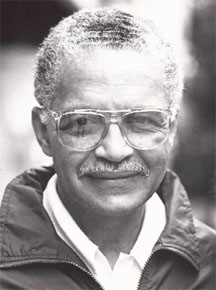Guyanese writer Jan Carew, best known for his novel Black Midas, died last Wednesday from natural causes at his home at Louisville, Kentucky, in the United States.
He was 92.
His wife, Joy Carew, told Stabroek News that while members of his family would profusely miss him and is still trying to come to grips with his death, they were relieved at his passing since he no longer has to suffer in illness.
“He touched many lives, both directly and indirectly, and while he is gone from us in a physical sense, I know he’ll remain in our collective hearts and minds,” she said.
Carew informed that her husband, who helped to write his own obituary, was never afraid of death.
He referred to himself as a Renaissance man and spent most of his leisure time travelling as that was his passion.

“A wandering minstrel uprooted and cast abroad by the imperial imperative, he rooted himself wherever he was in the struggles of the people around him. And he was in many places, wearing many faces, but always in the same cause: freedom for the oppressed and downtrodden—writing, teaching, broadcasting, engaging with mighty men and women” is how Carew is described in his obituary.
Born in British Guiana in 1920, two years after World War I, Carew spent most of his life abroad. He led varied lives as a writer, educator, philosopher and advisor to several nation states.
After his initial education in the then British Guiana, Carew went on to study at universities in the United States, Czechoslovakia and France. He had also been a political figure during the colonial era and worked with late President Cheddi Jagan in the fight for independence.
Carew is best known for his first novel Black Midas as well as The Wild Coast and his memoir, Ghosts in Our Blood: With Malcolm X in Africa, England and the Caribbean.
He most recent work, ‘Potaro Dreams: My youth In Guyana,’ a memoir which highlights his childhood years here, is scheduled for release sometime next year.
Carew worked in England as a broadcaster and writer with the BBC and lectured in race relations at London University’s Department of Extra-Mural Studies. He has also lived in Spain, Ghana, Canada and Mexico before settling in the United Stated, where he taught at many universities, including Princeton, Rutgers, George Mason, Lincoln University, and the University of Louisville.
His was also an Emeritus Professor of African Ameri-can Studies at the Northwes-tern University, where he taught from 1973 to 1987.
Tributes from the literacy fraternity poured in for Carew and included the Ministry of Culture Youth and Sport, literary critic Al Creighton and politician and writer Dr. Rupert Roopnaraine.
“Guyana has lost an important contribution to national literature… we all will remember his contribution especially how he made and used Guyanese legends as illustrated in the novels… Black Midas and the Coming of Amalivaca are examples of how he worked in the Amerindian legends into his story… he left that legacy in Guyana,” said Creighton.
On Friday, the Ministry of Culture said in a statement that though Carew spent most of his adult life away from his homeland, “his varied volume of work has depicted Guyana and the Caribbean, securing the region’s literary legacy amongst the international literary and academic landscape.”
Carew will be granted his wishes and will be cremated and interred with his wife’s family in Winston Salem North Carolina on December 29th. Apart from his wife, who is a professor at the University of Louisville, Carew is survived by his daughters Lisa St. Aubin de Teran, Shantoba Eliza Carew, and son David Christopher Carew and many grandchildren.





